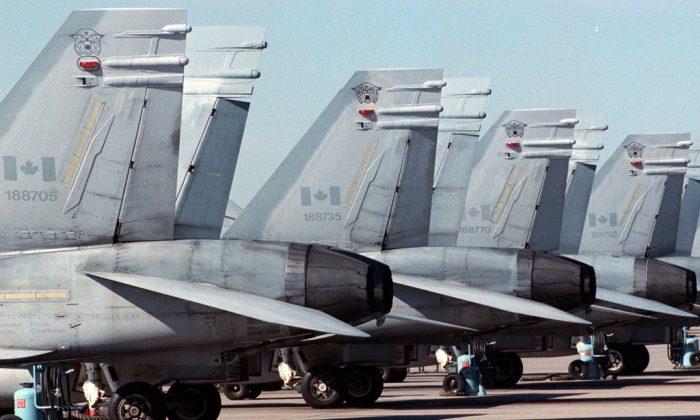OTTAWA, Canada—The U.S. will have one more ally to combat the Islamic State of Iraq and Levant (ISIL) after Canada voted Tuesday night to join the international coalition fighting against the group in Iraq.
Canada will send up to six CF-18 fighters and support aircraft on a six-month mission that the country’s foreign affairs minister said could be renewed if necessary.
The White House welcomed the news in a statement released late Tuesday.
“Canadians and Americans have fought alongside each other in several major conflicts over the past century, and we are grateful for Canada’s further contribution against terrorism.”
Military intervention was supported by Canadian Prime Minister Stephen Harper, who said Canada had to do its part to stop the spread of the extremist organization, also known as ISIS or IS.
“It has conducted a campaign of unspeakable atrocities against the most innocent of people. It has tortured and beheaded children, it has raped and sold women into slavery, it has slaughtered minorities...whose only crime is being or thinking differently from ISIL,” he said before the House of Commons last Friday.
The plan was put to a vote in Canada’s House, which holds a Conservative Party majority, the Party Harper belongs to, and a plan for combat was passed in a 157-134 vote.
Opposition Unconvinced
Two days of debate did little to convince Canada’s opposition parties to support the motion outlining Canada’s combat role. They voted against it, arguing Canada’s energies would be better spent on humanitarian efforts in the region. Already, Canada has pledged $10 million in humanitarian aid to victims, and 69 military advisers.
“There are many different ways for different members of the coalition to participate and to support and that is what we are talking about within the Liberal Party,” said Liberal Party leader Justin Trudeau.
Right now the mission only includes airstrikes, but supporters of a military role say that is not enough. They say there needs to be boots on the ground if the coalition is going to stem the immediate dangers ISIL poses to people in the region.
“If there is no security on the ground, humanitarian aid will not do anything,” said Rev. Majed El Shafie, founder of One Free World International before Canada’s parliamentary human rights committee last week.
It’s a position many supporters of the combat role have taken, but critics say military intervention could boost support for ISIL in the region. They contend ISIL will use the legitimacy of a war with the West to boost recruitment and grassroots support.
They also point to the complex history leading up to today, including the West’s previous support of Iraq’s former dictator, Saddam Hussein.
“If most Canadians knew the depth and the history of all these issues, they would be outraged by what the Canadian government is committing to, which is essentially adding more violence to an incredibly violent area of the world,” said Matthew Behrens, a coordinator for Homes Not Bombs. He was part of a small group of protesters gathered on the steps of Parliament this week opposing the motion that would draw Canada into combat.
Critics like Behrens argue that Canada has supported abusive regimes in the region including those in Saudi Arabia and Egypt, and should look beyond war to a long-term strategy to help develop and stabilize the region.
In the meantime, however, Canada will join a dozen other countries including the United States, Saudi Arabia, and the United Arab Emirates in airstrikes.
Canada’s move to join airstrikes against ISIL comes as the terrorist group encroaches on Turkey, a North Atlantic Treaty Organization (NATO) member. If ISIL does hit Turkey, Canada would have no choice but to support its military ally under the terms of the alliance.






Friends Read Free